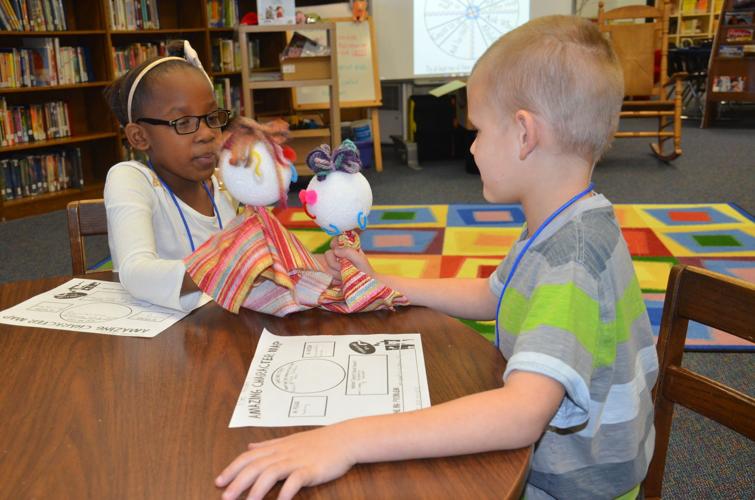Puppets can’t speak for themselves, but children at J.D. Lever Elementary recently gave them voices to learn lessons about literature and life.
Beginning with a study of the concept of conflict, or a central problem, in the structure of the stories they read, the first and second graders built puppets and created names, identities and conflicts for them. Then, they expanded the multiweek project from literature to real-life, learning techniques and strategies to resolve conflicts they might have with their siblings, their mom or dad or a classmate.
“I wanted them to see that conflict resolution is not just in the stories they read,” said Faith Barber, the media specialist at J.D. Lever, who created the project. “I wanted to enhance the concept of conflict and find ways the children could apply conflict resolution to situations in their own lives.”
Barber got the idea for the project after attending a workshop presented by SilverTrout.org at a S.C. Integrated Arts Conference. She then secured funding through DonorsChoose.org to be able to present the project to all first and second graders at J.D. Lever.
On Thursday, the children put what they had learned about conflicts and conflict resolution into practice.
First, Louise Dent, J.D. Lever’s guidance counselor, talked to the children about solving conflicts based on good character traits, including kindness, respect and responsibility.
Using their puppets to speak for themselves, some students next role played with Barber to resolve a problem: how siblings who had only one hour to watch TV could both see their favorite programs.
Then, working in pairs, the students created their own conflicts and developed strategies to resolve them, using the model to take a deep breath before making a deal, counting to 10, walking away, apologizing or finding another way to solve the problem.
“The project teaches the children how they are in control of the story of their own lives while also teaching them to make up their own stories with their puppets,” Barber said.
Talking through puppets gives children the freedom to express themselves, Barber said,
“Kids who will not usually speak up or be as engaged will speak through a puppet quicker than they will themselves because they’re separating the two,” she said. “The puppet is a whole different entity, and it’s much more comfortable for them.”
Using puppets, the children also can share their stories freely.
“Many of the conflicts the children came up with are fictitious, but some of them are speaking from experience,” Barber said. “They may be sharing things, whether you realize it or not, that they themselves are trying to figure out and deal with in their own lives.”
Dent agreed.
“Talking through their puppets, they are telling a true story of themselves,” she said. “It makes them more comfortable to say I had a problem or my mom did this or my dad did that. They’re willing to speak out. They’re giving of themselves.”





